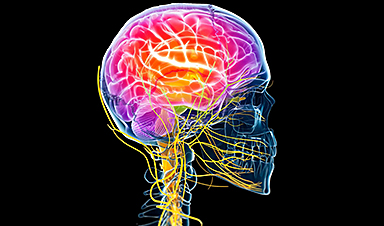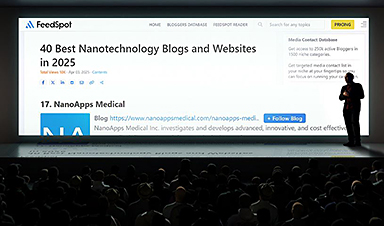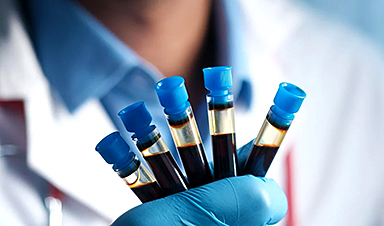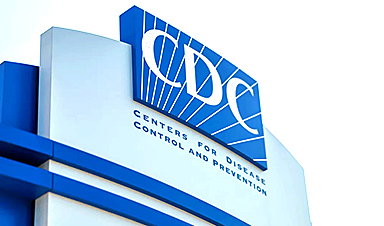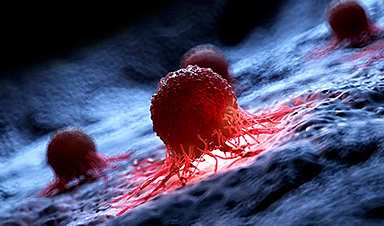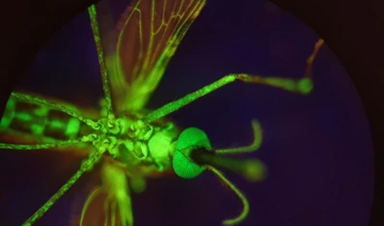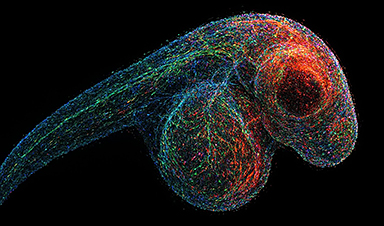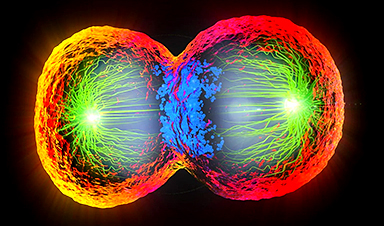Breathing synchronizes brain waves that support memory consolidation.
A new study from Northwestern Medicine reports that, much like a conductor harmonizes various instruments in an orchestra to create a symphony, breathing synchronizes hippocampal brain waves to enhance memory during sleep.
This is the first time breathing rhythms during sleep have been linked to these hippocampal brain waves — called slow waves, spindles, and ripples — in humans. Scientists knew these waves were linked to memory but their underlying driver was unknown.
“To strengthen memories, three special neural oscillations emerge and synchronize in the hippocampus during sleep, but they were thought to come and go at random times,” said senior study author Christina Zelano, professor of neurology at Northwestern University Feinberg School of Medicine. “We discovered that they are coordinated by breathing rhythms.”
Northwestern scientists discovered that hippocampal oscillations occur at particular points in the breathing cycle, suggesting that breathing is a critical rhythm for proper memory consolidation during sleep.
“Memory consolidation relies on the orchestration of brain waves during sleep, and we show that this process is closely timed by breathing,” said corresponding author Andrew Sheriff, a postdoctoral student in Zelano’s lab.
The study was recently published in the Proceedings of the National Academy of Sciences.
Implications for Sleep-Disordered Breathing
The findings have important implications for disordered breathing during sleep—such as sleep apnea—which is linked with poor memory consolidation.
We’ve all had the experience of better memories after a night of sleep. This was noted as far back as ancient Rome, when the scholar Quintillion wrote of the “curious fact” that “the interval of a single night will greatly increase the strength of the memory,” the study authors said. He was describing what we now call memory consolidation, which is accomplished by the exquisitely tuned coordination of different brain waves in the hippocampus.

“When you’re sleeping, your brain is actively replaying experiences you had during the day,” Sheriff said.
Sheriff had just returned from a conference in Reykjavik, Iceland, where he had to learn his way around a new city. “The hippocampus plays a major role in forming a map of a new area,” Sheriff said. “I would wake up and feel I had a better representation of the city around me. That was facilitated by the oscillations that occurred during my sleep, which we found are coordinated by breathing.”
The study indicates people with disrupted breathing during sleep should seek treatment for it, Sheriff said.
“When you don’t get sleep your brain suffers, your cognition suffers, you get foggy,” Sheriff said. “We also know that sleep-disordered breathing is connected with stroke, dementia, and neurodegenerative disorders like Alzheimer’s Disease.
“If you listen to someone breathing, you might be able to tell when they are asleep, because breathing is paced differently when you’re sleeping. One reason for that may be that breathing is performing a careful task: coordinating brain waves that are related to memory.”
Reference: “Breathing orchestrates synchronization of sleep oscillations in the human hippocampus” by Andrew Sheriff, Guangyu Zhou, Vivek Sagar, Justin B. Morgenthaler, Christopher Cyr, Katherina K. Hauner, Mahmoud Omidbeigi, Joshua M. Rosenow, Stephan U. Schuele, Gregory Lane and Christina Zelano, 16 December 2024, Proceedings of the National Academy of Sciences.
DOI: 10.1073/pnas.2405395121
The study was funded by the National Institute on Deafness and Other Communication Disorders and a Ruth L. Kirchstein Institutional National Research Award.
News
How Everyday Plastics Quietly Turn Into DNA-Damaging Nanoparticles
The same unique structure that makes plastic so versatile also makes it susceptible to breaking down into harmful micro- and nanoscale particles. The world is saturated with trillions of microscopic and nanoscopic plastic particles, some smaller [...]
AI Outperforms Physicians in Real-World Urgent Care Decisions, Study Finds
The study, conducted at the virtual urgent care clinic Cedars-Sinai Connect in LA, compared recommendations given in about 500 visits of adult patients with relatively common symptoms – respiratory, urinary, eye, vaginal and dental. [...]
Challenging the Big Bang: A Multi-Singularity Origin for the Universe
In a study published in the journal Classical and Quantum Gravity, Dr. Richard Lieu, a physics professor at The University of Alabama in Huntsville (UAH), which is a part of The University of Alabama System, suggests that [...]
New drug restores vision by regenerating retinal nerves
Vision is one of the most crucial human senses, yet over 300 million people worldwide are at risk of vision loss due to various retinal diseases. While recent advancements in retinal disease treatments have [...]
Shingles vaccine cuts dementia risk by 20%, new study shows
A shingles shot may do more than prevent rash — it could help shield the aging brain from dementia, according to a landmark study using real-world data from the UK. A routine vaccine could [...]
AI Predicts Sudden Cardiac Arrest Days Before It Strikes
AI can now predict deadly heart arrhythmias up to two weeks in advance, potentially transforming cardiac care. Artificial intelligence could play a key role in preventing many cases of sudden cardiac death, according to [...]
NanoApps Medical is a Top 20 Feedspot Nanotech Blog
There is an ocean of Nanotechnology news published every day. Feedspot saves us a lot of time and we recommend it. We have been using it since 2018. Feedspot is a freemium online RSS [...]
This Startup Says It Can Clean Your Blood of Microplastics
This is a non-exhaustive list of places microplastics have been found: Mount Everest, the Mariana Trench, Antarctic snow, clouds, plankton, turtles, whales, cattle, birds, tap water, beer, salt, human placentas, semen, breast milk, feces, testicles, [...]
New Blood Test Detects Alzheimer’s and Tracks Its Progression With 92% Accuracy
The new test could help identify which patients are most likely to benefit from new Alzheimer’s drugs. A newly developed blood test for Alzheimer’s disease not only helps confirm the presence of the condition but also [...]
The CDC buried a measles forecast that stressed the need for vaccinations
This story was originally published on ProPublica, a nonprofit newsroom that investigates abuses of power. Sign up to receive our biggest stories as soon as they’re published. ProPublica — Leaders at the Centers for Disease Control and Prevention [...]
Light-Driven Plasmonic Microrobots for Nanoparticle Manipulation
A recent study published in Nature Communications presents a new microrobotic platform designed to improve the precision and versatility of nanoparticle manipulation using light. Led by Jin Qin and colleagues, the research addresses limitations in traditional [...]
Cancer’s “Master Switch” Blocked for Good in Landmark Study
Researchers discovered peptides that permanently block a key cancer protein once thought untreatable, using a new screening method to test their effectiveness inside cells. For the first time, scientists have identified promising drug candidates [...]
AI self-cloning claims: A new frontier or a looming threat?
Chinese scientists claim that some AI models can replicate themselves and protect against shutdown. Has artificial intelligence crossed the so-called red line? Chinese researchers have published two reports on arXiv claiming that some artificial [...]
New Drug Turns Human Blood Into Mosquito-Killing Weapon
Nitisinone, a drug for rare diseases, kills mosquitoes when present in human blood and may become a new tool to fight malaria, offering longer-lasting, environmentally safer effects than ivermectin. Controlling mosquito populations is a [...]
DNA Microscopy Creates 3D Maps of Life From the Inside Out
What if you could take a picture of every gene inside a living organism—not with light, but with DNA itself? Scientists at the University of Chicago have pioneered a revolutionary imaging technique called volumetric DNA microscopy. It builds [...]
Scientists Just Captured the Stunning Process That Shapes Chromosomes
Scientists at EMBL have captured how human chromosomes fold into their signature rod shape during cell division, using a groundbreaking method called LoopTrace. By observing overlapping DNA loops forming in high resolution, they revealed that large [...]
